Wondering how to play jazz scales? We’re going to show you everything you need to know about jazz scales.
In this free guitar lesson you will learn:
- 6 essential jazz scales that will make you sound amazing.
- 7 quick & easy secrets that will help you master jazz scales.
- 2 jazz hacks which will turn you into a jazz master.
- 6 must-know jazz licks which will take your playing to the next level.
Over 250,000 guitar-learners get our world-class guitar tips & tutorials sent straight to their inbox: Click here to join them
What is a jazz scale?
A scale is a group of musical notes which work together. Scales are used to create melodies and solos.
A jazz scale is simply a scale that can be used over a piece of jazz music. Jazz scales often get compared to the ‘blues’ scale. The ‘blues’ scale is a specific scale which is used in blues music.
Many guitarists make the mistake of thinking that there is a dedicated ‘jazz scale’ which they can used over any kind of jazz progression.
However, jazz is a little more complicated than blues music. So in reality, to learn jazz scales you have to learn more than one scale.
Just like any type of scale, jazz scales fall into two categories: major and minor.
Let’s learn to play some jazz scales.

Major Jazz Scales
There are SO many different jazz scales out there. However, we’re going to learn 2 of the most common major jazz scales.
These are:
- The ionian scale aka the major scale.
- The lydian scale.
Any of these scales can be used over a major chord, or major chord progression.
If you’d like to know more about musical keys, go here: Learn Guitar Scales In 8 Easy Steps
For all of these examples we’re going to keep them in the key of C. That means that you could use them over a C major chord, or a progression in the key of C.
Major Jazz Scales – The Ionian Scale
The Ionian scale, aka the major scale is one of the most commonly used scales in jazz music.
This scale has been used countless by some of the greats. It’s a great point to start if you’re new to jazz.
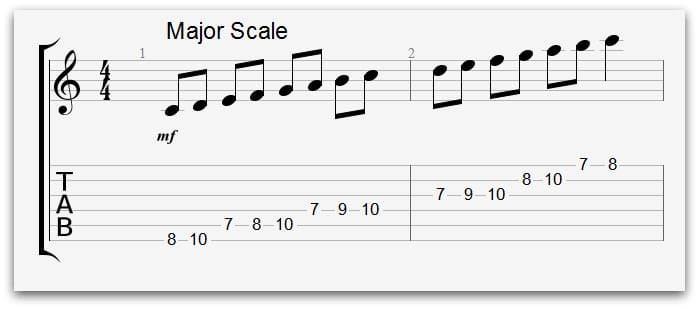
The ionian mode is made up of the following intervals:
- Root.
- Major second.
- Major third.
- Perfect fourth.
- Perfect fifth.
- Major sixth.
- Major seventh.
Major Jazz Scales – The Lydian Scale
The lydian mode is very similar to the ionian scale. Only one note is different.
The 4th note in this scale is sharpened, this gives the scale an eastern feel. It’s a fantastic alternative to the major scale, as it has a unique colour and sound.
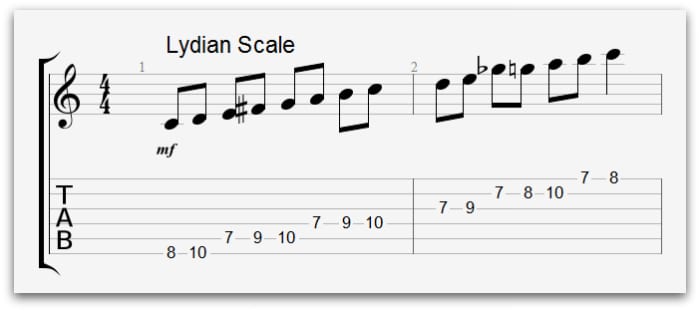
The lydian scale is made up of the following intervals:
- Root.
- Major second.
- Major third.
- Sharpened fourth
- Perfect fifth.
- Major sixth.
- Major seventh.
Can you see how the fourth note in the scale is sharpened, rather than kept natural? This is what gives the lydian scale such a cool sound.
Dominant Jazz Scales – The Mixolydian Scale
Another chord type which is commonly used in jazz music is the dominant chord, also known as the ‘7’ chord. Often you see these chords used in a 12 bar blues.
Want to learn blues guitar? Go here: Blues Guitar Lessons For Beginners – 4 Ways To Sound Awesome Quickly
Jazz is considered a more advanced version of the blues. So having this scale down is essential if you want to get that jazz blues sound into your playing.
Here’s the tab and notation, we’re still in the key of C for this one! So you could use this scale over a C7 chord, or a C blues.
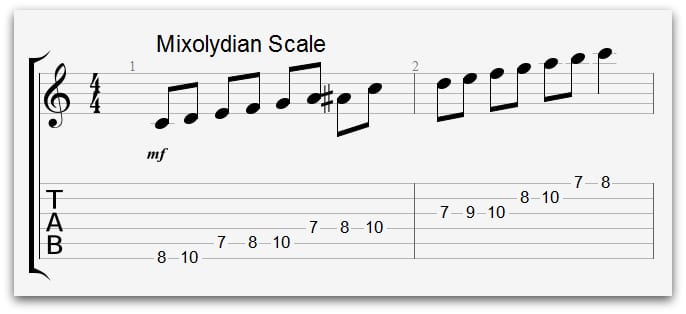
The mixolydian scale is very closely related to the major scale, there is only one interval different. That interval is the 7th. Here are the intervals for the mixolydian scale:
- Root.
- Major second.
- Major third.
- Perfect fourth.
- Perfect fifth.
- Major sixth.
- Flattened seventh.
In the major scale, we have a major seventh.
In the mixolydian scale, we have a flattened seventh. This is what gives the mixolydian scale its bluesy sound.
Minor Jazz Scales
The three most common jazz scales are:
- The dorian scale.
- The aeolian scale.
- The harmonic minor scale.
All of these examples can be used over a Cm chord or anything in the key of Cm.
Minor Jazz Scales – The Dorian Scale
This scale is one of the most commonly used minor scales. Latin and jazz great, Carlos Santana has been known to use this scale in his playing.
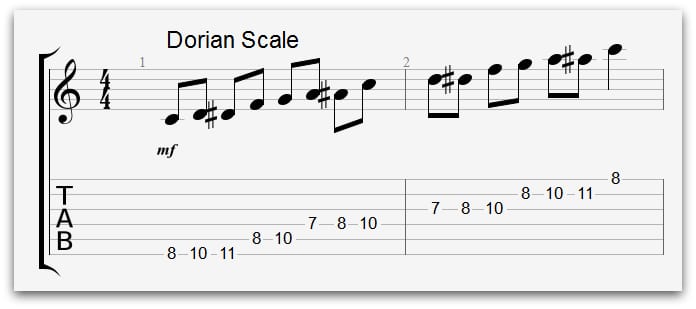
The dorian scale consists of the following intervals:
- Root.
- Major second.
- Minor third.
- Perfect fourth.
- Perfect fifth.
- Major sixth.
- Minor seventh.
Minor Jazz Scales – The Aeolian Scale
The aeolian scale aka the ‘natural minor’ scale is another common scale which is used by musicians. This scale is perfect if you want to create a dark mysterious sound.
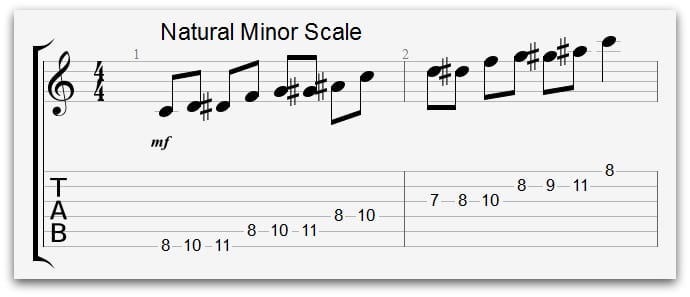
The aeolian scale is made up of these intervals:
- Root.
- Major second.
- Minor third.
- Perfect fourth.
- Perfect fifth.
- Minor sixth.
- Minor seventh.
This is very similar to the dorian scale, however this time we have a minor 6th note, rather than a major 6th note.
Minor Jazz Scales – The Harmonic Minor Scale
This scale adds a great latin/spanish feel to your guitar solos. If you fancy spicing up your solos, learn this scale!
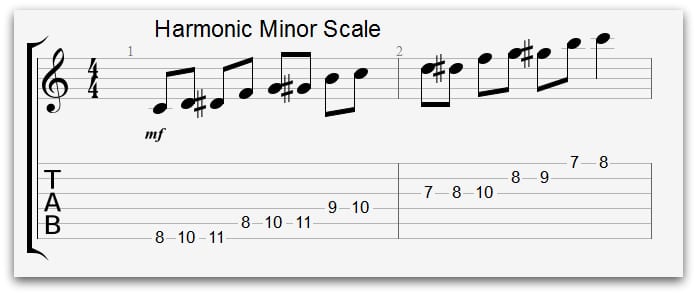
- Root.
- Major second.
- Minor third.
- Perfect fourth.
- Perfect fifth.
- Minor sixth
- Major seventh
Notice how the seventh note has changed, now we have a major seventh instead of a minor seventh. This interval gives the scale its spanish sound.
Looking to buy a jazz guitar? Check out this article from Dawsons, which will show you ALL of the best jazz guitars:Five Best Jazz Guitars | Dawsons Music
It's hard to understand which scales work with which keys.
So we created a cheat-sheet! A key and scale-finder that you can use again and again.
Get a custom guitar-learning plan here: Click here for GuitarMetrics™ Learn from the world's best guitar educators: Click here for our guitar coursesDownload our lead guitar cheat-sheet to make things easier
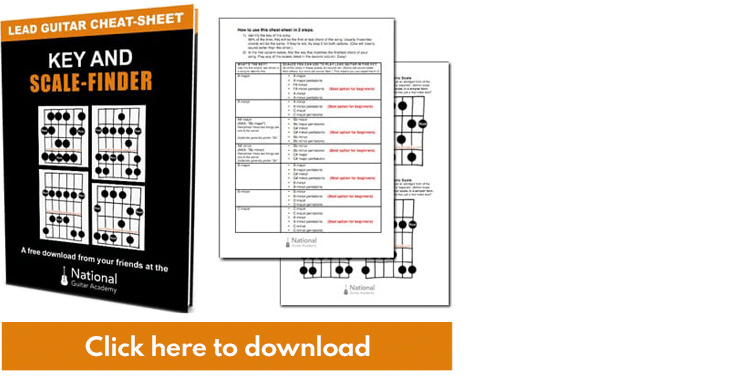
Get your personalised guitar-learning plan 🎸
World-Class Guitar Courses 🌎
Playing Jazz Scales In Other Keys
You don’t have to play these scales in C. You can play them in other keys too.
If you’re a guitar player, it’s as simple as changing your root note on the low E string.
For example, to play a scale in the key of A, you’d simply start on the 5th fret of the low E string (6th string) instead.
Or if you wanted to play any of these scales in the key of Eb, you’d move your scale shapes to the 11th fret.
Here’s a list of all of the notes on the low E string, try and play the following scales in all 12 keys:

- The major scale.
- The lydian scale.
- The dominant 7 scale.
- The dorian scale.
- The aeolian scale.
- The harmonic minor scale.
To learn more about scales go here: Learn Guitar Scales In 8 Easy Steps
If you don’t play guitar, it’s a little trickier!
To work out what the scales are in other keys.
- You need to think about the interval relations in a scale.
For example, if you were playing a major scale, the intervals are:
- Root.
- Major 2nd.
- Major 3rd.
- Perfect fourth.
- Perfect fifth.
- Major sixth.
- Major seventh.
This formula works for ALL major scales, all you have to do is change the root note, then you can play the scale in any key.
The tricky thing here is thinking about what the other intervals in the scale are in relation to the root note.
This does work for other scales, you just have to be aware what the intervals are in each scale.
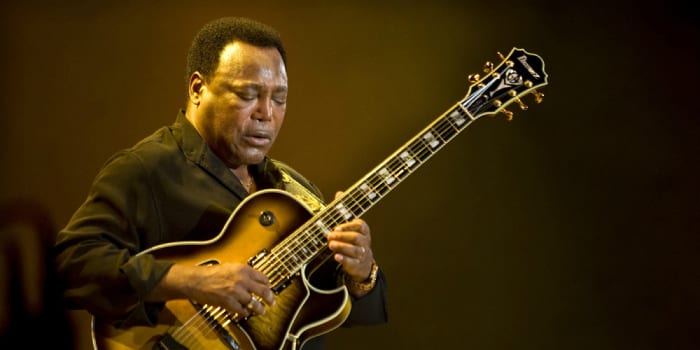
Why Do I Need To Know Jazz Scales?
Jazz scales are incredibly useful to know for many reasons. The main reason that you should learn jazz scales is to:
- Become a better improviser.
- Enhance your theory knowledge.
Jazz Improvisation
Almost ALL jazz music contains improvisation. It’s impossible to improvise without knowing jazz scales.
Jazz Theory
Another reason why you need to know is jazz scales is to help with your theory. Jazz can be a quite a dense subject when it comes to theory. However, scales can be fun and practical.
If you can learn more about scales, they will help your theory knowledge. This WILL make you a better jazz musician.
Get our best guitar tips & videos
Where should we send it?


